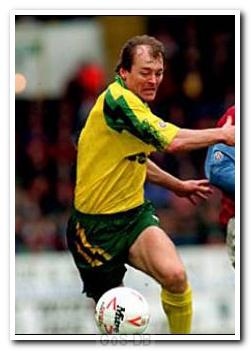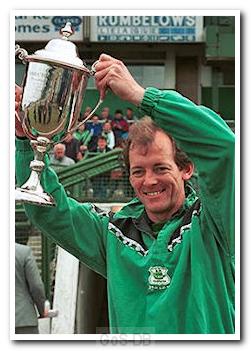
Thanks to Dave Rowntree for many of the player images after 1984.
Can you help? This page is the result of the best endeavours of all concerned. If you spot a mistake or know of facts to add, or have a better photo, please get in touch using 'Contact Us' (top, right).
Back to GoS-DB Hub Find Another Player
STEVE MCCALL
Born: 15 October 1960
1. Came from: Sheffield Wednesday Went to: Torquay United
1. First game: 28 March 1992 Last game: 16 April 1996
2. Came from: Torquay United Went to: Workington Town
2. First game: 08 August 1998 Last game: 06 May 2000
Appearances: 160 (149/11) Goals: 6
A Carlisle-born midfielder, McCall's career began at Ipswich Town and took off in 1979 when manager Bobby Robson thrust him into the first team. Two years later, he helped Ipswich win the UEFA Cup in 1980-81, beating AZ Alkmaar 5-4 on aggregate. He also went on to earn six caps for the England under-21s. He had previously won four caps for England Youth in 1978. He also won a solitary England B cap in 1978, against New Zealand. In total, he made over 300 appearances for the Suffolk side before moving to Sheffield Wednesday for £20,000, where he rarely played during his five years with the club, often because of injury, playing just 29 times, scoring twice. He also had a spell on loan at his hometown club Carlisle United, making six appearances. Joining Argyle in 1992 for £25,000, he remarkably won the Player of the Year award in both of his first two full seasons with the club.
McCall's accolade-laden start to his career at Argyle was warranted. He was the archetypal cultured midfielder who had the rare knack of making the game look painfully easy. He was an immaculate passer of the ball and a true exponent of the art of football. McCall also took charge of the club for two months following the departure of Peter Shilton and stayed on as a member of the playing squad when first Russell Osman, and then Neil Warnock were brought in. He then moved to Torquay United as a player-coach under Kevin Hodges, returning to Home Park when Hodges was appointed manager and played for another two years before retiring.
His playing career ended in 2000 at Argyle during his second spell. Ironically, at this time, he appeared in the famous Jimmy Glass game against his hometown club Carlisle, in which the goalkeeper famously scored in the 94th minute to keep Carlisle United in the Football League.
A brief spell with non-league Workington followed, before becoming a coach and then a scout for Ipswich Town in 2001. In September 2014, after 13 years with Ipswich, McCall was appointed chief scout for Colchester United before moving back to his hometown to take up a role as chief scout for Carlisle United in February 2022.
YOUR CONTRIBUTION
If you can add to this profile, perhaps with special memories, a favourite story or the results of your original research, please contribute here.
APPEARANCE DETAILS [reselect competitions]
The details below reflect appearances in all first-team competitions.
I'm very grateful to many who have helped write GoS-DB's player pen-pictures, and to Dave Rowntree, the PAFC Media Team and Colin Parsons for their help with photos. Thanks also to staff at the National Football Museum, the Scottish Football Museum and ScotlandsPeople for their valuable assistance.
The following publications have been particularly valuable in the research of pen-pictures: Plymouth Argyle, A Complete Record 1903-1989 (Brian Knight, ISBN 0-907969-40-2); Plymouth Argyle, 101 Golden Greats (Andy Riddle, ISBN 1-874287-47-3); Football League Players' Records 1888-1939 (Michael Joyce, ISBN 1-899468-67-6); Football League Players' Records 1946-1988 (Barry Hugman, ISBN 1-85443-020-3) and Plymouth Argyle Football Club Handbooks.
Greens on Screen is run as a service to fellow supporters, in all good faith, without commercial or private gain. We have no wish to abuse copyright regulations and apologise unreservedly if this occurs. If you own any of the material on this site, and object to its inclusion, please get in touch using the 'Contact Us' button at the top of the page.


